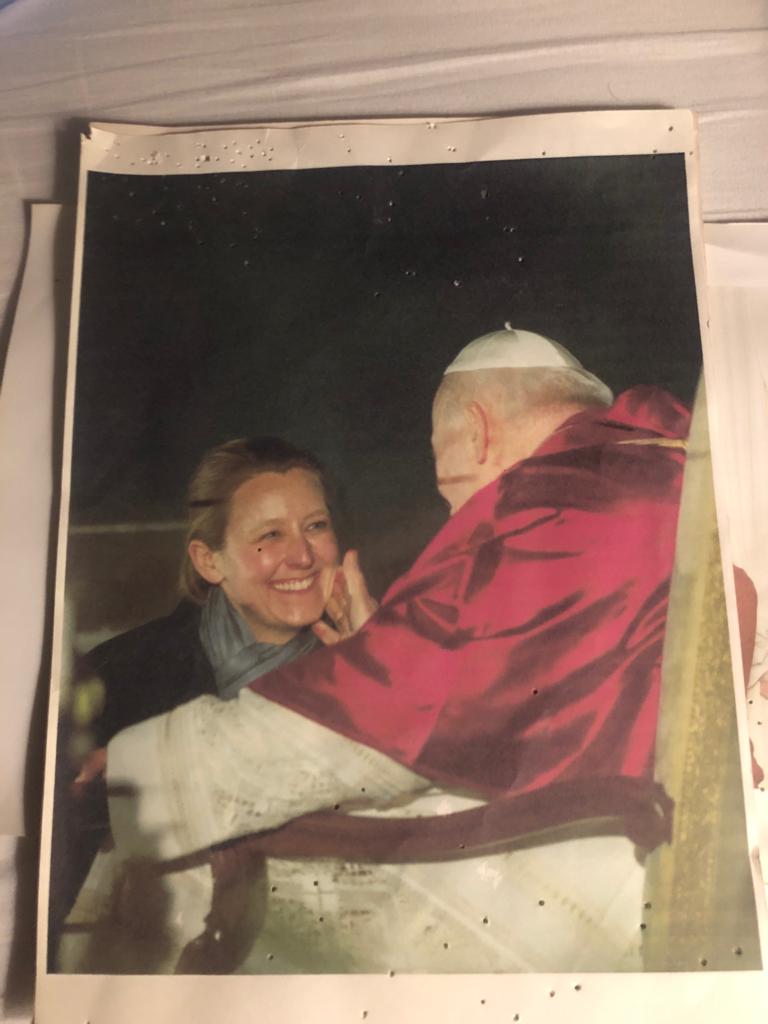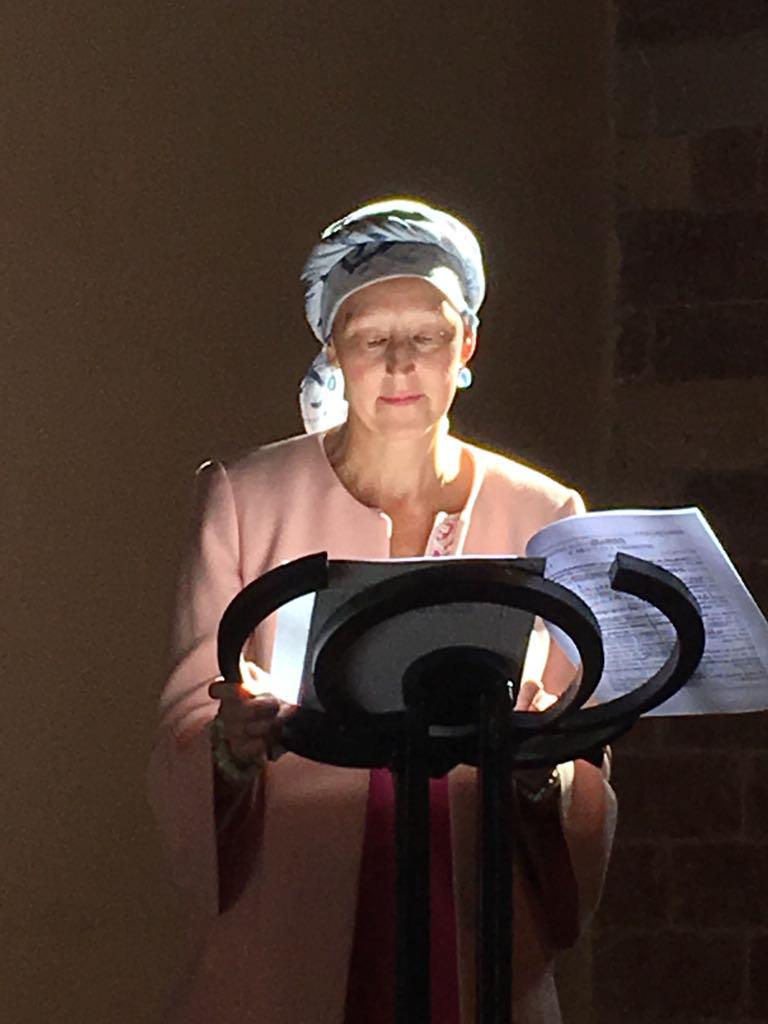
Above, the late Marie Czernin with Pope St. John Paul II on March 29, 2002. She had written a meditation for the 14th Station of the Via Crucis in the Colosseum that year, the stations recalling the death of Christ on the Cross. And John Paul II greeted her
Thirty days have now passed since October 28, when Marie Czernin passed away in Vienna after a 4-year long battle with cancer. She was 51.
During these 30 days of mourning, I was able to participate in a special rosary prayer group of about 200 people who in October prayed the rosary with Marie each night as she lay dying in her hospital bed, and have continued to pray the rosary each evening since her death.
The rosary begins at 8 p.m. in the evening in Italy and Austria, and at 2 p.m. Eastern Standard Time in the United States. If someone among you would like to join in this daily rosary, in which prayers are offered for the entire Church, for world peace, and for the physical and spiritual needs of individuals, please write to me.
Below I offer a few thoughts, some drawn from the Fathers of the Church, about death and dying, and life and resurrection.
—RM
***
“As they pass through the valley of tears, they make it a place of springs.” —Psalm 84:6
“Her room is full of prayers, and a candle is burning. She is still full of joy, and thinking about everybody else.” —Marie’s friend Stephanie in a message to me, describing her hospital room
“The world, seen through her eyes, became shining and beautiful.” —Manuel de Teffé, a friend who participated in the final rosaries prayed for and with Marie
“I loved Marie and I admired her. I admired her because there was something miraculous about her… Marie never lost her enthusiasm, was always radiant, always young, even when she was terminally ill. Marie never lost her special ability to see the good in everyone. And with this special view of people, she was like Jesus, who even met his murderers with nothing but pure compassion. —a woman named Benedikta, writing in German, shortly after Marie’s death
“If you are to bring the divine onto and into the world, then you have to give it space — infinite space. Prayer creates this space and casts worries and swirling thoughts outside… She was on and in this world, and she loved this world of ours. But at the same time she was also in another world, to which she has now gone completely home. For all of us who accompanied her, the memory of her remains, and the confidence that our own deaths as well will be such a homecoming.” —Benedikta
“The Son of God descends to the dead in order to rescue those detained by death… Jesus comes to free the just and restore them to the light of the resurrection.” —Meditation written by Marie for the Via Crucis of Pope John Paul II in the Colosseum for Good Friday, March 29, 2002
“May she rest in peace and may her memory be eternal!” —A Russian Orthodox theologian, upon learning of Marie’s death
===========
Letter #116, 2022, Monday, November 28: Facing death
In a time of great confusion, and of great sorrow due to many troubles, and to the loss of loved ones, we need the light of Christ, the Logos, the Word of God, the Reason of God, the Meaning of God.
We need the light of Christ.
We need Christ.
This is the “Good News” that must be proclaimed, in order to overcome the apparent meaninglessness of this world, the apparent unforgivability of our moral failings and faults, the apparent victory of physical sickness and death.
Christ overcome all of it.
Christ brings meaning and reason, forgiveness and redemption, light and life.
This is the point of the church.
And this is the point of these letters.
***
“Grieve, but not without hope” — St Augustine Of Hippo
“Of necessity we must be sorrowful when those whom we love leave us in death. Although we know that they have not left us behind forever but only gone ahead of us, still when death seizes our loved one, our loving hearts are saddened by death itself. Thus the apostle Paul does not tell us not to grieve but ‘not to grieve like those who are without hope.’ Let us grieve, therefore, over the necessity of losing our loved ones in death but with the hope of being reunited with them. If we are afflicted we still find consolation. Our weakness weights us down, but faith bears us up. We sorrow over the human condition, but find our healing in the divine promise.” —St Augustine of Hippo, Sermon 172
“Let us, if possible, remember death unceasingly, for this memory leads us to lay aside all our worries and troubles, to guard our minds and to pray incessantly, to be dispassionate to the body and to be disgusted with sin; to tell the truth, almost all virtues, lively and active, come out of it.” Saint Hesychius of Jerusalem
“Those who diligently pursue virtue, are truly set free from suffering and bondage when they leave this life.” —Saint John Chrysostom
“You should always be waiting for death but not be afraid of it; both are indeed the real characteristics of a person who pursues wisdom.” —Saint Nilus of Sinai
“The memory of death is always saving, and the more so when we stand in front of a deceased person…” —Saint Theodore the Studite
“Regarding oneself dead develops a spirit of brokenness and tenderness – the root and fruit of repentance and tears.” —Saint Theophan the Recluse
“Just as the behavior of the carnal and spiritual man is different and their lifestyles are unequal, so their death and their future condition after death are not similar either. Death is terrible for the carnal man, but peaceful for the spiritual man; death is sad for the carnal man, but joyful for the spiritual man; death is distressing for the carnal man, but sweet for the spiritual man. The carnal man dies both temporarily and eternally: to be carnally minded is death, says the Holy Apostle (Rom. 8:6), but the spiritual man gets to Eternal Life through this death, for spiritual wisdom is life and peace… Hell is for the carnal man; but the spiritual man will have his dwelling in heaven. The carnal one enters the eternal fire with the devil and his angels, but the spiritual one will live with Christ, whom he serves diligently, in eternal joy. Both are rewarded according to their works, which they have done in the flesh.” —Saint Tikhon of Zadonsk
“Do not be afraid of death, but prepare for it by living in holiness. If you are ready for death, you will stop being afraid of it. If you love the Lord with all your heart, you will desire death.” —Saint Demetrius of Rostov

Note: Giving Tuesday is tomorrow, November 29. I will be sending two letters tomorrow at the beginning and end of the day to ask you for your support of our work with a link to our donation page. Best wishes. —RM






Facebook Comments